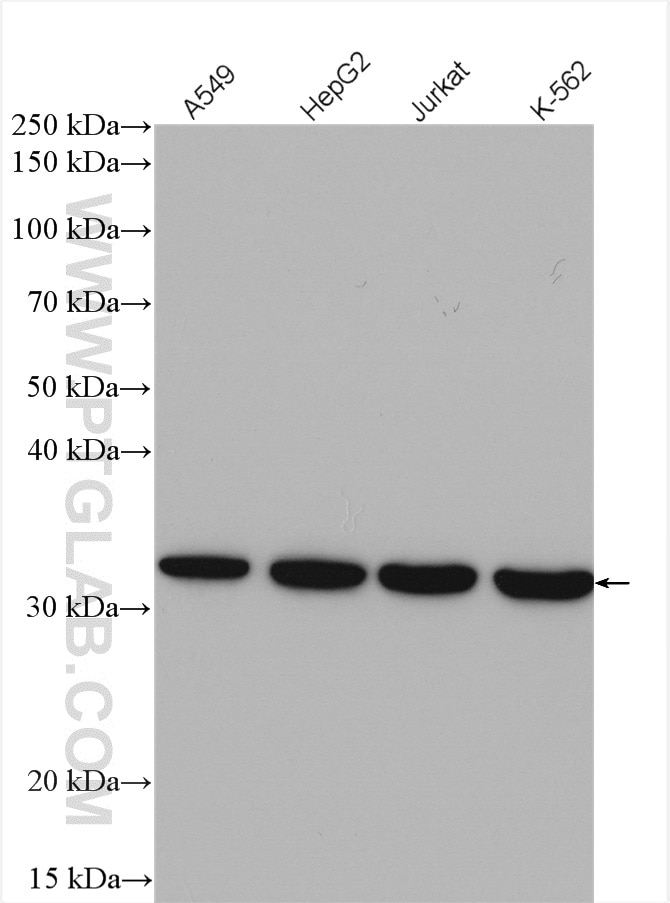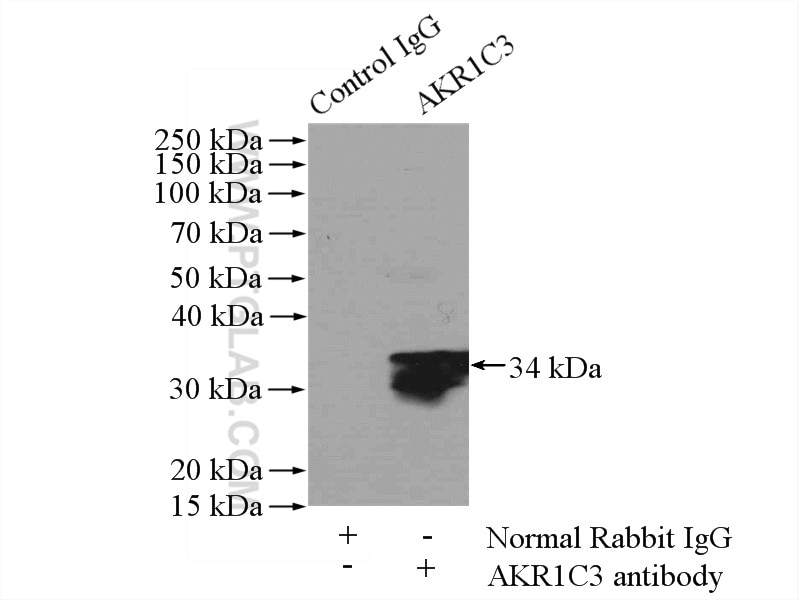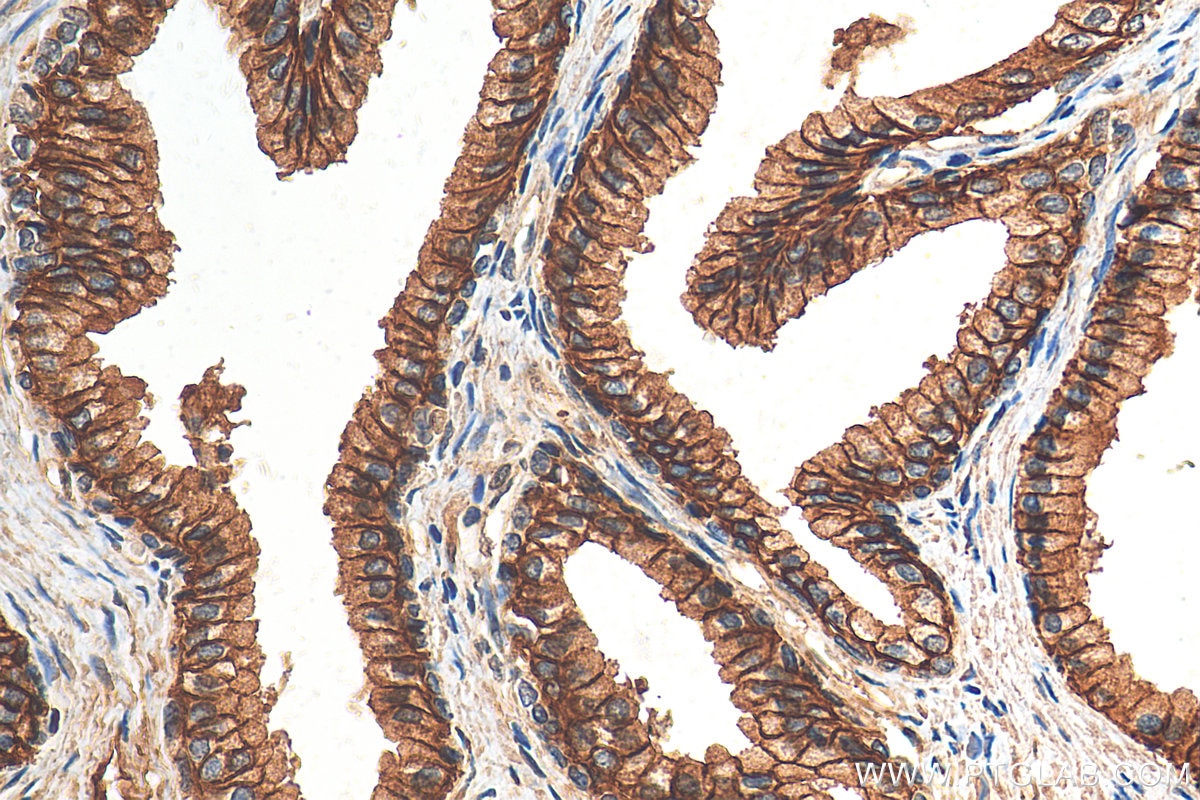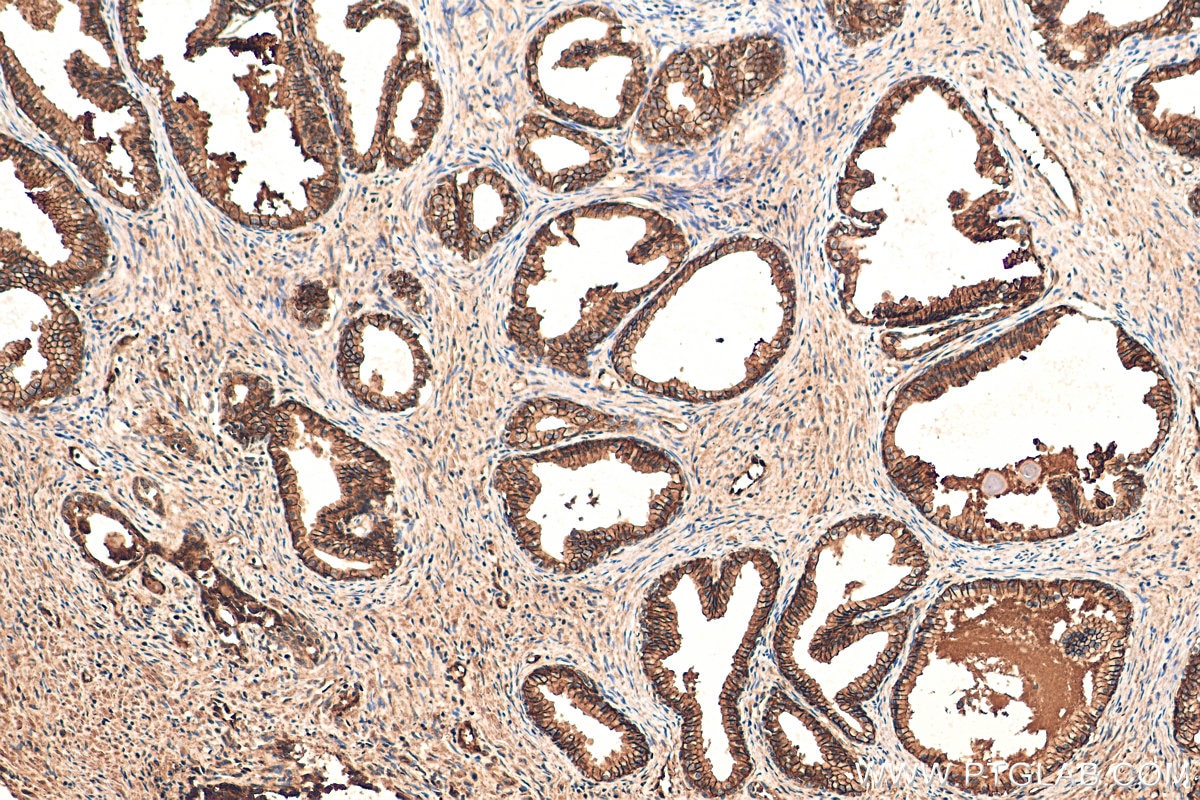Tested Applications
| Positive WB detected in | A549 cells, HepG2 cells, Jurkat cells, K-562 cells |
| Positive IP detected in | HepG2 cells |
| Positive IHC detected in | human prostate cancer tissue Note: suggested antigen retrieval with TE buffer pH 9.0; (*) Alternatively, antigen retrieval may be performed with citrate buffer pH 6.0 |
Recommended dilution
| Application | Dilution |
|---|---|
| Western Blot (WB) | WB : 1:500-1:2000 |
| Immunoprecipitation (IP) | IP : 0.5-4.0 ug for 1.0-3.0 mg of total protein lysate |
| Immunohistochemistry (IHC) | IHC : 1:50-1:500 |
| It is recommended that this reagent should be titrated in each testing system to obtain optimal results. | |
| Sample-dependent, Check data in validation data gallery. | |
Published Applications
| WB | See 10 publications below |
| IHC | See 4 publications below |
Product Information
11194-1-AP targets AKR1C3 in WB, IHC, IP, ELISA applications and shows reactivity with human samples.
| Tested Reactivity | human |
| Cited Reactivity | human, mouse, rat |
| Host / Isotype | Rabbit / IgG |
| Class | Polyclonal |
| Type | Antibody |
| Immunogen | AKR1C3 fusion protein Ag1674 Predict reactive species |
| Full Name | aldo-keto reductase family 1, member C3 (3-alpha hydroxysteroid dehydrogenase, type II) |
| Calculated Molecular Weight | 323 aa, 37 kDa |
| Observed Molecular Weight | 34 kDa |
| GenBank Accession Number | BC019230 |
| Gene Symbol | AKR1C3 |
| Gene ID (NCBI) | 8644 |
| RRID | AB_2224414 |
| Conjugate | Unconjugated |
| Form | Liquid |
| Purification Method | Antigen affinity purification |
| UNIPROT ID | P42330 |
| Storage Buffer | PBS with 0.02% sodium azide and 50% glycerol , pH 7.3 |
| Storage Conditions | Store at -20°C. Stable for one year after shipment. Aliquoting is unnecessary for -20oC storage. 20ul sizes contain 0.1% BSA. |
Background Information
AKR1C3(Aldo-keto reductase family 1 member C3) is also named as DDH1, HSD17B5, KIAA0119, PGFS and belongs to AKR1C family. .In humans, at least four AKR1C isoforms exist: AKR1C1, AKR1C2, AKR1C3, AKR1C4 and AKR1C3 shares >86% sequence identity with these three highly related human AKRs(PMID:18574251). It catalyzes the conversion of aldehydes and ketones to alcohols and androgen, estrogen, PG, xenobiotics metabolism. The rat kidney possesses a dimeric form of 75 kDa(PMID:18574251).
Protocols
| Product Specific Protocols | |
|---|---|
| WB protocol for AKR1C3 antibody 11194-1-AP | Download protocol |
| IHC protocol for AKR1C3 antibody 11194-1-AP | Download protocol |
| IP protocol for AKR1C3 antibody 11194-1-AP | Download protocol |
| Standard Protocols | |
|---|---|
| Click here to view our Standard Protocols |
Publications
| Species | Application | Title |
|---|---|---|
Mol Cancer Ther AKR1C3 promotes AR-V7 protein stabilization and confers resistance to AR-targeted therapies in advanced prostate cancer. | ||
World J Gastroenterol Prostaglandin F2α synthase promotes oxaliplatin resistance in colorectal cancer through prostaglandin F2α-dependent and F2α-independent mechanism | ||
Int J Mol Med 15-Deoxy-Δ(12,14)-prostaglandin J(2) induces growth inhibition, cell cycle arrest and apoptosis in human endometrial cancer cell lines. | ||
Neurosci Lett Mangiferin alleviates 6-OHDA-induced Parkinson's disease by inhibiting AKR1C3 to activate Wnt signaling pathway | ||
J Clin Med A New Histology-Based Prognostic Index for Aggressive T-Cell lymphoma: Preliminary Results of the "TCL Urayasu Classification" | ||
Transl Oncol AKR1C3 promotes progression and mediates therapeutic resistance by inducing epithelial-mesenchymal transition and angiogenesis in small cell lung cancer |









